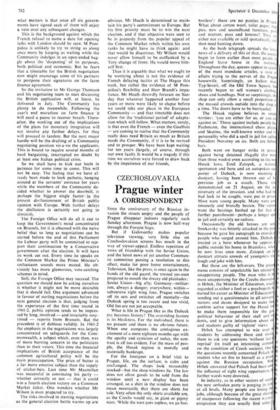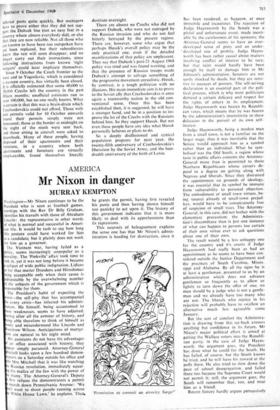CZECHOSLOVAKIA
Prague winter
A CORRESPONDENT
Since the anniversary of the Russian in- vasion the streets empty and the people of Prague disappear indoors regularly each Sunday afternoon. Prague is now half-way through the Forsyte Saga.
But if Galsworthy makes popular television viewing, very little else on Czechoslovakian screens has much in the way of viewer-appeal. Endless repetition of vows of friendship with the Soviet Union, and the latest news of yet another Commun- ist committee passing a resolution to this effect, make for poor home entertainment, Television, like the press, is once again in the hands of the old guard, the trusted yes-men prepared to mouth the dreary old platitudes: Soviet Union—big ally; Germany—militar- ism, always a danger; everywhere, within— subversive right wing foes. Prague switches off its sets and switches off mentally—the Dubcek spring is too recent and too vivid. Old lies are not yet acceptable.
What is life in Prague like as the Dubcek era becomes history? The overriding feature is its bleakness. For the individual, there is no present and there is no obvious future. When one compares the contagious ex- citement of a mere eighteen months ago with the apathy and cynicism of today, the con- trast is all too evident. For the mass of peo- ple, the Husak regime is morally and materially bankrupt.
For the foreigner on a brief visit to Prague, life, on the surface, is calm and unchanged. The shops look reasonably stocked—but the shop-windows lie. The law does not allow goods to be sold from the window until a new display has been arranged, so a shirt in the window does not mean necessarily that there are shirts for sale. Very often the only shirts available are, as the Czechs would say, in giant or pigmy sizes. 'While the west goes topless, we ao bot-
tomless': there are no panties in Prague What about cotton wool, toilet paper, na pies, new and secondhand furniture, purl, and mutton, peas and lemons? They are either not available or sold sporadically, and then need hunting down.
As the bush telegraph spreads the late news of a delivery of this or that, the queues begin to form earlier than most people in England leave home in the morning Throughout the day, queues appear in search of the most mundane articles, a state o affairs trying to the nerves of the Pragu housewife. Surprisingly, an Italian shop Typ-Severi, off the Old Town Square. ha recently begun to sell women's clothing shoes and handbags. Not so surprisingly, th shop can only allow a small proportion o the massed crowds outside into the shop a time. The doors have to be barricaded.
The Husak regime believes in simpl verities: 'you are either for us, or you are against us.' Those against include people lit Pachmann, the international chess plae, and Skutina, the well-known writer and personality who did a spell in jail for callin President Novotny an ox. Both are behin bars.
Both went on hunger strike in prote, against being detained illegally (for mor than three weeks) even according to the ne Husak laws. Emil Zatopek, a nation sportsman and hero and an outspoken su porter of Dubcek, is now manning dustcart, having been thrown out of hi .previous job as a coach. Those 1;11 demonstrated on 21 August, on the an niversary of the invasion, and who had bad luck to be caught, were put in prise Most were young people. Many were co tinuously and brutally beaten. The victi want the beatings hushed up for fear further punishment—perhaps a longer spe in jail and certainly no redress.
Occasionally the old • heroes are see Smrkovsky was bitterly attacked in the p because he gave his autograph to crowds people who surged around him. Dubcek treated as a hero whenever he appears public outside his home in Bratislava, whe he now lives once more. Zatopek on h dustcart attracts crowds of youngsters uh n laugh and joke with him.
But those are the left-overs. The prese menu consists of unpalatable lies uttered unappetising people. The man who is t most unappetising for the Czechs then-Ica% is Hrbek, the Minister of Education, usual) regarded as either a fool or a psychopath. started his career as Minister of Education sending out a questionnaire to all univers rectors and deans designed to make th confirm active support for the Husak li to make them responsible for the g political behavidur of their staff and 51 dents.- and to give information about st and students guilty of 'rightist' views.
Hrbek has attempted to win over students by addressing them and imit them to ask any questions 'without fear reprisal' (in itself an interesting corn on the condition of Czech society). One the questions recently concerned Palach. I student who set fire to himself as a prof against the . Russian occupation. Vt. Hrbek answered that Palach had been U the influence of right wing opportunists, further words were drowned.
In industry, as in other sectors of soc the new orthodox party is purging its ra at all levels. Many people are losing jobs, although because of the great short of manpower following the recent woes emigration they can usually find other,
p
5
inferior posts quite quickly. But managers have to prove either that they did not sup- port the Dubcek line (not an easy feat in a country where almost everybody did), or else that they are now reliable. Not all those who are known to have been too outspoken have yet been replaced, but their subordinates know the rest will soon disappear, and no longer carry out their instructions, since following instructions from known 'right wingers' could later implicate themselves. Since 9 October the Czech frontier to the west and to Yugoslavia, which is considered a western country, has virtually been closed. It is officially estimated that some 40,000 to 50,000 Czechs left the country in the past fifteen months; unofficial estimates run to over 100,000, but no one really knows. What is certain is that this was a brain-drain which Czechoslovakia could not afford. Those with exit permits valid for 10 October onwards found their permits simply were not honoured; those at the border at midnight on the night of the ninth were sent back, and those sitting in aircraft were asked to disembark. Many of these people, having disposed of their apartments and their furniture, in a country where both apartments and furniture are virtually irreplaceable, found themselves literally destitute overnight.
There are almost no Czechs who did not support Dubcek, who were not outraged by the Russian invasion and who do not feel bitterly betrayed by the present regime. There are, however, some who argue that perhaps Husak's overall policy may be the only practical one, even if the detailed manifestations of that policy are unpleasant. They say that Dubcek's post-21 August 1968 policy was tried and was found wanting, and that the presence of Russian troops made Dubcek's attempt to salvage something of the progressive movement unrealistic. Husak, by contrast, is a tough politician with no illusions. His main immediate aim is to prove to the Soviet ally that Czechoslovakia is once again a trustworthy nation in the old con- ventional sense. Once this has been established then, it is suggested, he will have a stronger hand, and be in a position to im- prove the lot of the Czechs with the Russians behind him. So they support Husak. But not even these people have any idea what Husak personally believes or plans to do.
So a deeply disillusioned and cynical population prepares for next year, the twenty-fifth anniversary of Czechoslovakia's liberation by the Soviet Army, and the hun- dredth anniversary of the birth of Lenin.







































 Previous page
Previous page